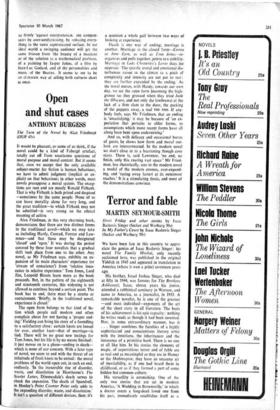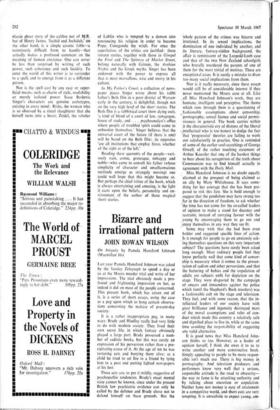Terror and fable
MARTIN SEYMOUR-SMITH
Short Friday and other stories by Isaac Bashevis Singer (Seeker and Warburg 30s) In My Father's Court by Isaac Bashevis Singer (Secker and Warburg 3(s) We have been late in this country to appre- ciate the genius of Isaac Bashevis Singer: his novel The Family Moskat, only recently acclaimed here, was published in the original Yiddish in 1945 and appeared in translation in America (where it won a prize) seventeen years ago.
His brother, Israel Joshua Singer, who died at fifty in 1944, was famous for The Brothers Ashkenazi; Isaac, eleven years his junior, attended a rabbinical seminary in Warsaw, and came to America, as a journalist, in 1935. A remarkable novelist, he is one of the greatest —and most individual—exponents of the art of the short story in all literature. The basis of his achievement is his epic capacity : nothing he writes reads as though it had been invented. Nor, in some extraordinary manner, has it . . . Singer combines the faculties of a highly sophisticated and conscientious literary artist with the intuitions, the inheritances and the innocence of a primitive bard. There is no one at all like him. In his stories the elements of magic, of superstitious terror and of fable are as real and as meaningful as they are in Homer or the Mabinogion; they have an uncanny air of inevitability, as if one had heard them in childhood, or as if they formed a part of some hidden but common culture.
His versatility is astonishing. One of the only two stories that are set in modern America, 'A Wedding in Brownsville,' in which a doctor meets a long-dead loved one from his past, immediately establishes itself as a classic ghost story of the calibre not of KR. but of Henry James. lachid and Jechidah,' on the other hand, is a simple cosmic fable--:a notoriously difficult form to handle—that actually makes a profound comment on the meaning of human existence. One can never be less than surprised by writing of such power, such coherence and such lucidity. To enter the world of this writer is to surrender to a spell, and to emerge from it as a diffetent person.
Nor is the spell cast by any easy or super- ficial means, such as charm of style, readability or merely isolated power. Isaac Bashevis Singer's characters are genuine archetypes, existing in every mind: Risha, the woman who is so obsessed by a ritual slaughterer that she herself turns into a beast; Zeidel, the scholar
of Lublin who is tempted by a demon into renouncing his religion in order to become Pope; Cunegunde the witch. For once the superlatives of the critics are justified: these sixteen stories, together with those in Gimpel the Fool and The Spinoza of Market Street, belong naturally with Grimm, the Arabian Nights and the Greek myths. Singer has been endowed with the power to express all that is most marvellous, wise and merry in his culture.
In My Father's Court, a collection of news- paper pieces Singer wrote about his rabbi father's Beth Din in a poor district of Warsaw early in the century, is delightful, though not on the very high level of the short stories. The Beth Din is a rabbinical court (now dying out), 'a kind of blend of a court of law, synagogue, house of study, and . . . psychoanalyst's office where people of troubled spirit could come to unburden themselves.' Singer believes that the universal court of the future (if there is one) will be based on the Beth Din:. its opposites 'are all institutions that employ force, whether of the right or of the left.'
Reading these accounts of the people—vari- ously .vain, comic, grotesque, unhappy and noble—who came to consult his father (whose simplicity of character and unselfconscious rectitude emerge as strangely moving) one could well hope that this might become so. But perhaps the chief virtue of the book, which is always entertaining and amusing, is the light it casts upon the beliefs, personality and en- vironment of the author of those magical short stories.































 Previous page
Previous page